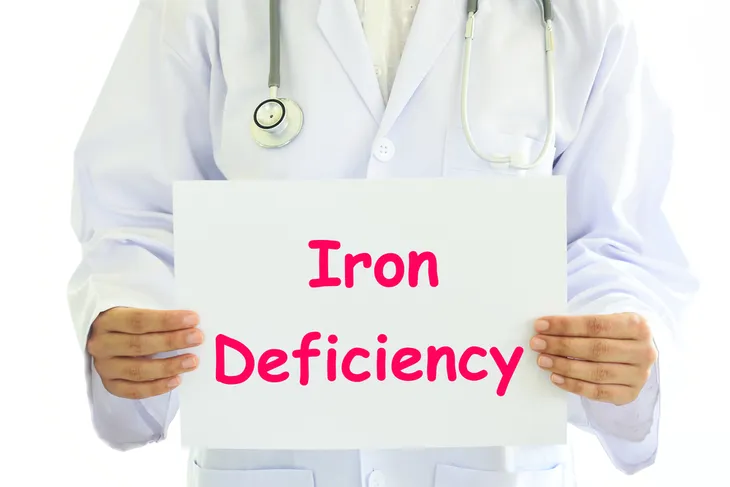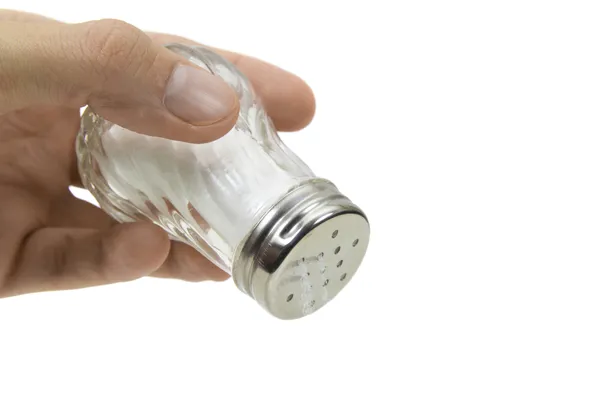You likely don’t think about how much iodine is in your diet on a regular basis. However, the essential chemical element is responsible for energy regulation as well as for triggering the production of thyroid hormones. Because iodine is a common addition to table salt (since the 1920s) iodine deficiency hasn’t been that common. However, researchers at the Boston University School of Medicine found that certain population groups are prone to iodine deficiency—including vegans and vegetarians and those who don’t eat animal milk, seafood, bread, or eggs, as well as expectant moms.
Think you may have an iodine deficiency? Try Optimox Iodoral’s Iodide Thyroid Support Supplement – an Amazon bestseller with a 4.5+ star rating and over 2,300 consumer reviews. (As an Amazon Associate this site earns from qualifying purchases.)
Here are 14 indicators of iodine deficiency and potential risk factors…
Signs and Symptoms
Goiter (Swelling in the Neck)
The most common sign of an iodine deficiency is an enlarged thyroid gland, also known as a goiter. The American Thyroid Association explains that this happens “as [the thyroid] tries to keep up with demand for thyroid hormone production.” A goiter is hard to ignore because it’s a large swollen lump where the thyroid is located. It can be extremely uncomfortable for the patient as it can cause trouble swallowing, breathing, and even in severe cases, cause choking while laying down, says Everyday Health.
If you think that you’re suffering from a goiter, the source advises contacting a doctor immediately. Request a physical assessment and get a professional opinion. If your doctor suspects you’re suffering from an iodine deficiency, you’ll most likely have a 24-hour urine iodine test done to make sure.
Weight Gain
We’re not talking about the weight gain that comes after eating unhealthy or a lack of exercise, this would be an obvious change in weight without any other lifestyle factors that could have contributed to it. If you’ve experienced unexpected weight gain that seems unnatural, it could be due to an issue with the thyroid, like hypothyroidism, which means you’re suffering from an iodine deficiency. “It may occur if the body does not have enough iodine to make thyroid hormones. This is because thyroid hormones help control the speed of your metabolism, which is the process by which your body converts food into energy and heat,” writes Healthline.
To many of us, this sounds like a nightmare because we don’t need any more help in the weight gain department! An iodine deficiency causes the body to burn fewer calories at rest which means the more calories that are eaten, the more fat is stored. Yikes! In some cases, a slow metabolism can be fixed by eating more iodine-rich foods because they’ll encourage the body to create more thyroid hormones.
Fatigue
We all get tired from time to time, but people who are fatigued due to a thyroid issue will be constantly tired no matter how much sleep they get. Think of it this way, do you find it hard to stay awake at gatherings or in the evening? Do you catch yourself actually nodding off? This is the level of tired we’re talking about. Healthline refers to a study published in the Hippokratia Medical Journal which found that 80-percent of people suffering from low iodine levels constantly feel tired, sluggish, and weak.
These symptoms occur because thyroid hormone levels are needed to generate the body’s energy. “When thyroid hormone levels are low, the body can’t make as much energy as it usually does. This may cause your energy levels to plummet and leave you feeling weak,” writes Healthline. The source cites another study which looked at 2,456 people who were all suffering from low thyroid hormone levels and the majority of them labeled fatigue and weakness as their most common symptom.
Hair Loss
Hair loss is something that is usually associated with aging or stress, but it can also be due to nutrient deficiencies like an iodine deficiency. Our thyroid hormones control many aspects of our body’s daily functioning, including the growth of hair follicles. “When your thyroid levels are low, your hair follicles may stop regenerating. Over time, this may result in hair loss,” writes Healthline. “For this reason, people with an iodine deficiency may also suffer from hair loss.”
The source refers to a study that examined 700 participants with low thyroid hormone levels. The results found that 30-percent of these patients suffered from hair loss. However, other studies have found the side effect of hair loss to only affect people with low thyroid hormone levels who also have a family history of hair loss. Either way, if you’re someone who knowingly suffers from an iodine deficiency and you’re also experiencing hair loss, eating more iodine-rich foods could help control the hair loss.
Dry Skin
Dry, flaky skin is an unfortunate side effect of cold, dry air, especially in the winter. It’s also a result of low iodine levels. “Thyroid hormones, which contain iodine, help your skin cells regenerate. When thyroid hormone levels are low, this regeneration doesn’t occur as often, possibly leading to dry, flaky skin,” explains Healthline. “Additionally, thyroid hormones help the body regulate sweat. People with lower thyroid hormone levels, such as those with an iodine deficiency, tend to sweat less than people with normal thyroid hormone levels.” Since sweat is one of the ways we keep our skin moist, the lack of sweat might be what is causing dry, flaky skin.
According to a study published in the the Hippokratia Medical Journal, 77-percent of people with low thyroid hormone levels will experience dry skin.
Sensitive to Cold
We tend to assume that people who are cold all the time have poor circulation, but it could also mean that they’re suffering from an iodine deficiency. Healthline notes that some studies have found 80-percent of people with low thyroid hormones are more susceptible to cold than those who don’t. “Since iodine is used to make thyroid hormones, an iodine deficiency can cause your thyroid hormone levels to plummet,” says Healthline. “Given that thyroid hormones help control the speed of your metabolism, low thyroid levels may cause it to slow down. A slower metabolism generates less heat, which may cause you to feel colder than usual.”
Yet another thing that our thyroid hormones can affect is the activity of brown fat. This particular type of fat is responsible for generating heat. If we’re suffering from low thyroid levels due to an iodine deficiency, it could prevent the brown fat in our body from doing its job properly which is to generate heat to keep us warm, hence why those with low iodine levels tend to feel cold more often.
Slowed Heart Rate
Heart rate refers to how often our heart beats per minute. If your heart rate is slower than average, it could be due to low iodine levels. According to Healthline, our heart rate is affected by our iodine levels. Too little iodine can cause our heart rate to slow down while too much of it will cause the heart rate to speed up. A slowed heart rate can cause low blood pressure and have other side effects, most of which we’ve already listed here including fatigue, weakness, dizziness, and could even lead to fainting.
Trouble Remembering Things
Do you have trouble remembering things? If so, it could be due to a nutrient deficiency. Our bodies are built to function a certain way, but they are susceptible to dysfunction when we don’t take care of them or don’t feed them the right nutrients and minerals. Iodine is needed to help our brain function to the best of its ability. A study that looked at over 1,000 adults found that those with higher thyroid hormone levels were able to mentally perform better than those who had low thyroid levels.
“Thyroid hormones help your brain grow and develop. That’s why an iodine deficiency, which is required to make thyroid hormones, can reduce brain development,” explains Healthline. The source also goes on to state that studies have shown the hippocampus, “the part of the brain that controls long-term memory, appears to be smaller in people with low thyroid hormone levels.” Interesting!
Heavy or Irregular Periods
While irregular and heavy periods are definitely annoying, they do happen. Sometimes it’s for no other reason than just bad luck, but they are also signs of an iodine deficiency. Similar to many of the other symptoms on this list, heavy or irregular periods are caused by low thyroid hormones, and as we previously mentioned, iodine is needed to make thyroid hormones.
Healthline refers to a study where 68-percent of women with low thyroid hormones experienced irregular menstrual cycles. “Research also shows that women with low thyroid hormone levels experience more frequent menstrual cycles with heavy bleeding. This is because low thyroid hormone levels disrupt the signals of hormones that are involved in the menstrual cycle,” writes the source.
Pregnancy Complications
According to research from the Americas at Iodine Global Network, iodine deficiency in pregnant or breastfeeding women can also affect their children during infancy and even later in childhood. For instance, a baby born to an iodine-deficient mother can suffer developmental disorders and lower IQ.
Babies and infants breastfed by moms who are iodine deficient have also been linked to delayed growth and the development of hearing and speech issues.
Risk Factors
People with Other Nutrient Deficiencies
One of the risk factors for an iodine deficiency is other nutritional deficiencies like iron, selenium, vitamin A, and possibly zinc. An article published in the journal Best Practice & Research Clinical Endocrinology & Metabolism found these deficiencies could impact the functioning of the thyroid.
So how common are these deficiencies? Research published in The Journal of Nutrition said that many older Americans do fall below the recommended amount of zinc, whereas a vitamin A deficiency is quite rare, “but some people who have fat malabsorption are at risk, including those with cystic fibrosis,” writes Everyday Health. The same source also goes on to say that a selenium deficiency is also quite rare in the United States, but people who are going through kidney dialysis or living with HIV are at a higher risk.
The most common deficiency is iron, and it’s most prominent among pregnant women or people who’re suffering from blood loss. Other high-risk groups are vegetarians, infants, and children, says Everyday Health. Luckily it can easily be replaced through food or dietary supplement.
Restricted Diets
Those who restrict their diets due to a food allergy (i.e., celiac or casein allergy) or due to a life choice, (i.e., vegans or vegetarians) may be at heightened risk of iodine deficiency due to low levels of iodized salt intake, or lack of animal milk, seafood, eggs, or bread in the diet.
If you adhere to a restrictive diet, taking an iodine supplement may help keep iodine levels balanced. However, we recommend speaking to your doctor first to make sure supplementation doesn’t negatively interact with other medications (i.e., water pills, blood pressure medications) that you may be taking.
Expecting and Breastfeeding Moms
According to research from the American Thyroid Association, pregnant and breastfeeding women are also at a heightened risk of iodine deficiency. For instance, a 2013 health report entitled the Vanguard Study, prepared by the National Children’s Study (NCS) revealed that women who were pregnant and/or breastfeeding women reported low iodine levels overall.
This is why the American Thyroid Association recommends all pregnant and breastfeeding women take prenatal vitamins with 150-micrograms of iodine with doctor supervision. Balanced Iodine levels help prevent several birth and developmental issues—such as congenital deformities, low growth rates, hearing and speech issues, still birth, infertility, miscarriage, and early delivery.
So How Much Salt Should We Eat?
While many health experts, including the American Heart Association, tell us we should be limiting our sodium consumption, a certain amount of iodine is imperative to prevent thyroid issues and birth problems.
You don’t require much salt to fulfill iodine requirements (one teaspoon of salt = 150-micrograms of iodine) considering that the Institute of Medicine recommends healthy adult males and females consume 150-micrograms of iodine per day. While pregnant women should get 220-micrograms and women who are breastfeeding need 290-micrograms per day.

















